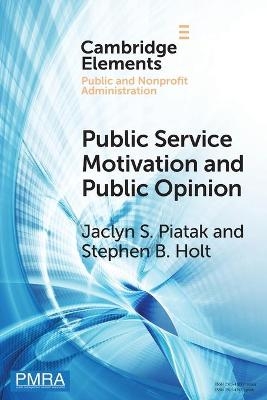
Public Service Motivation and Public Opinion
Examining Antecedents and Attitudes
Seiten
2021
Cambridge University Press (Verlag)
978-1-108-96400-5 (ISBN)
Cambridge University Press (Verlag)
978-1-108-96400-5 (ISBN)
Practitioners, policymakers, and scholars across fields and disciplines seek to understand factors that shape public opinion and public service values, especially in today's polarized context. As society faces increasing polarization and persistent inequities, who has public service motivation and how does this shape policy preferences?
Practitioners, policymakers, and scholars across fields and disciplines seek to understand factors that shape public opinion and public service values, especially in today's polarized context. Yet we know little about how the two relate. Research on public service motivation (PSM), a drive to help others grounded in public institutions, has grown to examine career decisions and behaviors within and outside the workplace, but does the influence of PSM extend to individual values? Using data from the Cooperative Congressional Election Study surrounding the 2016 US presidential election, we first examine the antecedents of PSM; how do individual characteristics as well as socioeconomic and sociocultural factors influence levels of PSM? Second, we describe the role PSM plays in shaping public opinion on policy preferences, budget priorities, and political behaviors. Findings have implications for both understanding who has PSM as well as how PSM shapes public preferences, attitudes, and behaviors.
Practitioners, policymakers, and scholars across fields and disciplines seek to understand factors that shape public opinion and public service values, especially in today's polarized context. Yet we know little about how the two relate. Research on public service motivation (PSM), a drive to help others grounded in public institutions, has grown to examine career decisions and behaviors within and outside the workplace, but does the influence of PSM extend to individual values? Using data from the Cooperative Congressional Election Study surrounding the 2016 US presidential election, we first examine the antecedents of PSM; how do individual characteristics as well as socioeconomic and sociocultural factors influence levels of PSM? Second, we describe the role PSM plays in shaping public opinion on policy preferences, budget priorities, and political behaviors. Findings have implications for both understanding who has PSM as well as how PSM shapes public preferences, attitudes, and behaviors.
1. Introduction; 2. Methods; 3. Who Has PSM?; 4. PSM and Public Opinion; 5. Discussion; 6. Conclusion.
| Erscheinungsdatum | 09.03.2021 |
|---|---|
| Reihe/Serie | Elements in Public and Nonprofit Administration |
| Zusatzinfo | Worked examples or Exercises |
| Verlagsort | Cambridge |
| Sprache | englisch |
| Maße | 152 x 229 mm |
| Gewicht | 154 g |
| Themenwelt | Sozialwissenschaften ► Pädagogik ► Sozialpädagogik |
| Sozialwissenschaften ► Politik / Verwaltung ► Staat / Verwaltung | |
| Sozialwissenschaften ► Soziologie | |
| Wirtschaft ► Betriebswirtschaft / Management ► Planung / Organisation | |
| ISBN-10 | 1-108-96400-1 / 1108964001 |
| ISBN-13 | 978-1-108-96400-5 / 9781108964005 |
| Zustand | Neuware |
| Informationen gemäß Produktsicherheitsverordnung (GPSR) | |
| Haben Sie eine Frage zum Produkt? |
Mehr entdecken
aus dem Bereich
aus dem Bereich
Grundlagen - Konzepte - Methoden
Buch | Softcover (2023)
Kohlhammer (Verlag)
CHF 47,60
eine praxisorientierte Einführung
Buch | Softcover (2024)
Kohlhammer (Verlag)
CHF 61,60
ein Lehrbuch zum Kita-Management
Buch | Softcover (2023)
Kohlhammer (Verlag)
CHF 64,40


